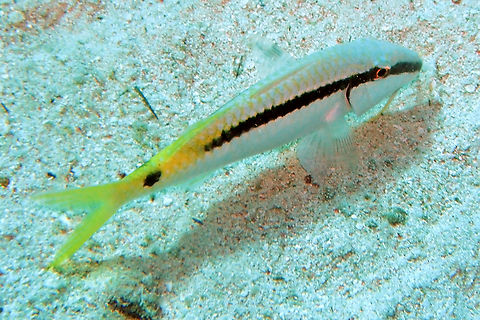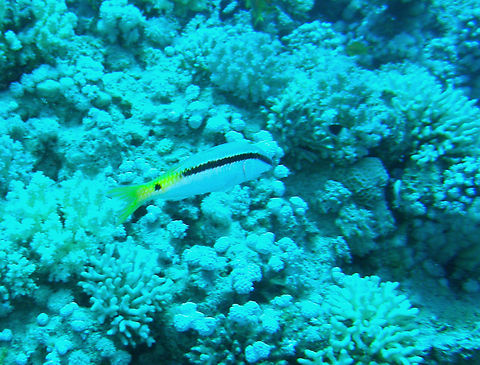
Appearance
"Parupeneus forsskali" can reach a common length of about 25 centimetres, with a maximum length of 28 centimetres in males. The Red Sea goatfish has a relatively elongate body and a pointed snout, with the twin chin barbels typical of goatfishes. These fish have eight dorsal spines, nine dorsal soft rays and seven anal soft rays. The body color is white with a broad black to dark brown stripe, sometimes tending to reddish, reaching from the upper lip through the eye and along the body, followed by an irregular roundish black spot at the base of the yellow caudal peduncle. Body above stripe is grayish green. The caudal fin is yellow, while the second dorsal and anal fins have narrow blue and yellow stripes.
Naming
The species name "forsskali" honors the Swedish naturalist and explorer Peter Forsskål. Forsskål originally described this fish as "Mullus auriflamma" but the International Commission on Zoological Nomenclature suppressed this name in its decision number 846 and in 1976 Fourmanoir & Guézé proposed the name "Pseudupeneus forsskali".Distribution
This species can be found in the Indian Ocean, from the Red Sea into the Gulf of Aden and in Socotra. Through the Suez Canal it is established in the eastern Mediterranean. These marine subtropical fish are shallow sandy bottoms and reef-associated, with a depth range 1–45 metres.Behavior
Red Sea goatfish spend most of their time moving slowly in small groups over the bottom searching for prey with their barbels. They mainly feed on small invertebrates living on sand bottoms.Habitat
This species can be found in the Indian Ocean, from the Red Sea into the Gulf of Aden and in Socotra. Through the Suez Canal it is established in the eastern Mediterranean. These marine subtropical fish are shallow sandy bottoms and reef-associated, with a depth range 1–45 metres.References:
Some text fragments are auto parsed from Wikipedia.